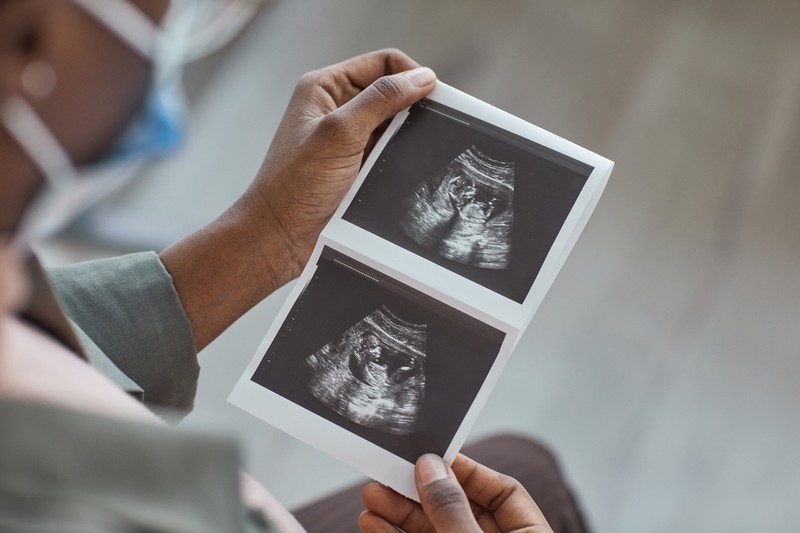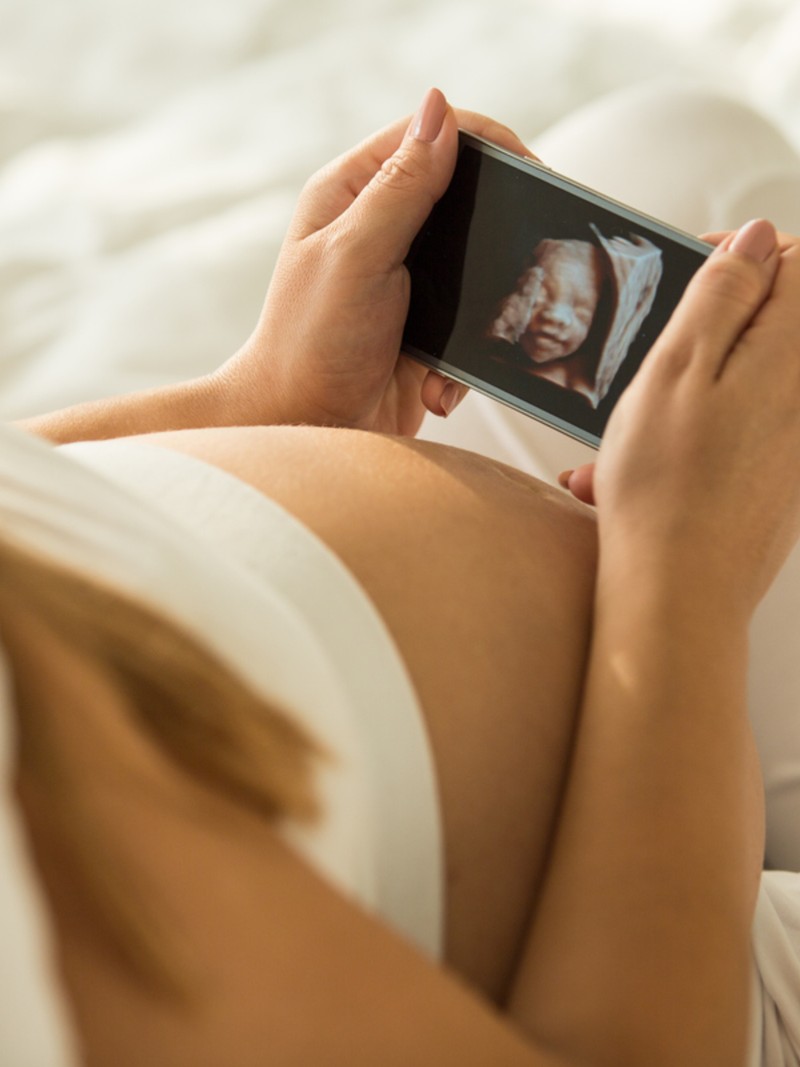The Scans & Tests To Expect Throughout Your Pregnancy
Lesley Bland Is A Registered Midwife At My Expert Midwife. Here, She Goes Through The Scans And Tests All Women In The UK Are Offered:
Routine Scans
At the booking appointment with your midwife, you will be offered several screening tests including two routine ultrasound scans, both of which have very specific functions. Ultrasound scans are usually external scans (occasionally they can be internal if needed) and they involve:
- Lying on your back on a couch propped up with pillows.
- The sonographer will then ask permission to expose your abdomen.
- Ultrasound gel will be squirted onto your abdomen and the sonographer will use a probe applied with slight pressure to create an image of your baby on the machine.
The first of the two routine NHS scans takes place between ten and 14 weeks of pregnancy based on your Last Menstrual Period (LMP).
- Also known as the Dating Scan, the sonographer will confirm the number of babies and take measurements of baby to establish an estimated due date (EDD).
- You will be offered further screening to indicate how likely it is that your baby has one of three genetic syndromes – Down’s, Edward’s, and Patau’s (Trisomy 18, Trisomy 21, or Trisomy 13). The sonographer measures a pad of fat at the back of baby’s neck, the Nuchal Translucency (NT), which alongside a blood test gives you a result of either a higher or lower chance of one or more of the three syndromes.
The second routine ultrasound scan is a longer scan focused on the wellbeing of your baby, that will also confirm the location of the placenta. Sometimes known as the mid-pregnancy scan or Fetal Anomaly Scan (FAS), this takes place between 18-21 weeks.
- The sonographer takes measurements of baby to check growth but also examines the major organs to check for any anomalies.
- The scan measures the volume of fluid surrounding baby.
- If your hospital offers gender identification and you would like to know, the sonographer may be able tell you. However, this may not be possible if baby is in an awkward position, and it is never 100% guaranteed.
Optional Scans
It is quite common to be offered extra scans in pregnancy, usually in the third trimester. There are many reasons for this and if you are unsure as to why these are recommended do discuss this with your midwife or doctor who will be able to provide you with more information. Some of the reasons why extra scans are offered are:
- If you smoke.
- If you had a previous small birthweight baby.
- If your baby’s mid-pregnancy scan plots small for dates.
- If your customized growth chart suggests there may have been accelerated or decelerated growth.
- If you are diabetic (Type 1, Type 2 or Gestational).
- If you bleed during pregnancy.
- If you have a low BMI <18 or a high BMI >35.
- If you develop pre-eclampsia.
- If you are pregnant with more than one baby.
- If you have a known low-lying placenta.
- If there is a concern about the volume of liquor (fluid) around baby.
- If you experience reduced fetal movements.
- If baby has known abnormalities.
Routine Tests
As well as the two routine ultrasound scans there are other screening tests offered during pregnancy. All tests are offered to you and you can accept them all or decide which ones you want and don’t want.
- BMI – calculated from your height and weight at booking (eight to ten weeks).
- Urine dip at every appointment.
- Blood pressure checks at every appointment.
- Booking blood tests – HB level, blood group and rhesus status, antibody screen, sickle cell anaemia and thalassaemia, Infection screening including HIV, Hepatitis and Syphilis (blood test eight to ten weeks)
- HB level and blood group/rhesus status and antibody screen repeated in the third trimester (blood test 28 weeks)
- Glucose Tolerance Test (GTT) for gestational diabetes offered routinely in some trusts and on specific criteria in others (blood test 16 and/or 26 weeks)
- Fetal rhesus group if offered by local trust (blood test 16 weeks)
- Down’s Syndrome, Edwards’ Syndrome, Patau’s Syndrome (blood test in conjunction with NT ultrasound scan 10-14 weeks)
- Carbon monoxide monitoring (breathalyser at booking for all and at every appointment if smoker)
- Symphysis Fundal Height (SFH) measurements plotted on Customised Growth Chart (CGC)

Optional Tests
Occasionally in pregnancy you may be offered additional tests – usually because of a change to the risk factors in your pregnancy. For example if your baby’s movements have changed from a normal pattern, or you have had any vaginal bleeding you will be offered an extra ultrasound scan and dependent on gestation, CTG (Cardiotocograph which measures baby’s heart rate patterns) to assess baby’s wellbeing, or if any of your screening bloods, such as Down’s, Edward’s or Patau’s, come back as high chance, you will be offered counselled and further diagnostic tests including CVS (Chorionic Villus Sampling) and Amniocentesis.
You can also choose to have the non-invasive Harmony Test, which analyses cell free DNA in maternal blood and gives a strong indication of whether the baby is at high or low chance of having trisomy 21 (Down syndrome), trisomy 18 (Edwards syndrome) or trisomy 13 (Patau syndrome). It can also tell you the gender of your baby.

Extra Scans
You can pay to have some ultrasound scans in pregnancy done privately, either alongside or instead of the routine NHS scans. Private scans tend to offer some extras including the option of having 3D or 4D scans, which are not offered by the NHS. If you choose to go privately for scans, choose a reputable company where scans are reviewed by a health care professional as the scans form just one part of the bigger picture which may change the care pathway you follow during pregnancy.
As well as routine NHS dating and anomaly scans, you can choose to have a number of different private scans, including a viability scan from approximately six weeks, gender scan from 12 weeks and Nuchal Translucency scan between 11-14 weeks, and as already mentioned 3D and 4D scans in the second half of pregnancy.
Although it is not thought that there are any risks associated with ultrasound scans to either you or to baby private scans do tend to be longer and, therefore, baby is exposed to ultrasound waves for longer. The Royal College of Obstetricians and Gynaecologists (RCOG) have also advised that unnecessary scans, including viability scans without medical indication, should be avoided before ten weeks’ gestation as this is when the embryo/fetus is at its most vulnerable.
Dr Shruti Nathwani From TheChildrensMedic.com Has A Four-Year-Old Child And Is Pregnant With Her Second Child. Here She Shares Her Experiences
For some, ultrasound scans can be enjoyable and for others they are a cause of anxiety. It’s useful to know that they are not meant to cause any discomfort and are considered to have no side effects making them safe during the entire pregnancy. Ultrasound scans use sound waves to build an image of the baby in the womb. Both the dating and fetal anomaly scan are 2D ultrasound scans that produce black and white images. Remember, as the scans are medical examinations, your consent must be obtained to undertake them. So, if you do not want to find out if your baby has a condition, you do not have to have the scan and your decision will be respected. It’s always worth having a discussion with your maternity team as they will be best placed to advise you further.
I’ll never forget hearing our baby’s heartbeat at the second scan. It was between 18-21 weeks, and it was such a special moment. For many, another special moment is finding out the sex of your baby, which you should speak to your sonographer about before the scan. Finding out the gender is interestingly not a part of the national screening programme, and each hospital will have a different policy. Remember, a sonographer can’t be 100% certain about the gender of the baby either.
As someone who has had a miscarriage, private ultrasound scans were a blessing. They helped ease my anxiety. We decided to go for an ‘early reassurance scan’ at around ten weeks. This meant I didn’t have to wait the full 12 weeks for a scan. Some places offer early reassurance scans at six weeks, but you sometimes get told to come back later as the foetal heartbeat not yet be detectable.
We also opted to have an extra growth scan and a 3D wellbeing scan at 27 weeks. The growth scan obtained measurements that were plotted on a graph to see how well baby was growing. The 3D scan is an incredible ultrasound scan that can allow you to see physical characteristics of your baby’s face if baby is positioned suitably for the scan. You may also be offered a video of the scan and pictures to take home with you.
Another private test that we opted for was NIPT (non-invasive prenatal testing). There are many different companies that conduct this test and it’s important to choose the test that is suited to your family. We chose to have prenatal testing as it can test for other conditions aside from the three that the NHS screening programme detects as mentioned above. The accuracy of some of the private NIPT tests are also quite high. The NIPT is conducted via a blood test from the mother, and it is also possible, using this sample, to find out the gender of your baby if you wanted to know early on.
Private tests do come with a price tag, and we re-prioritised our personal finances to fund them. We decided the testing was hugely helpful for our mental health because of my medical history. But there’s no right or wrong, everyone’s situation is different.
Visit MyExpertMidwife.com & TheChildrensMedic.com.
DISCLAIMER: We endeavour to always credit the correct original source of every image we use. If you think a credit may be incorrect, please contact us at info@sheerluxe.com.

/https%3A%2F%2Fsheerluxe.com%2Fsites%2Fsheerluxe%2Ffiles%2Fwebsite-images%2F2025%2F04%2Fnew-parenting-background-image.jpg?itok=au3AjSlw)